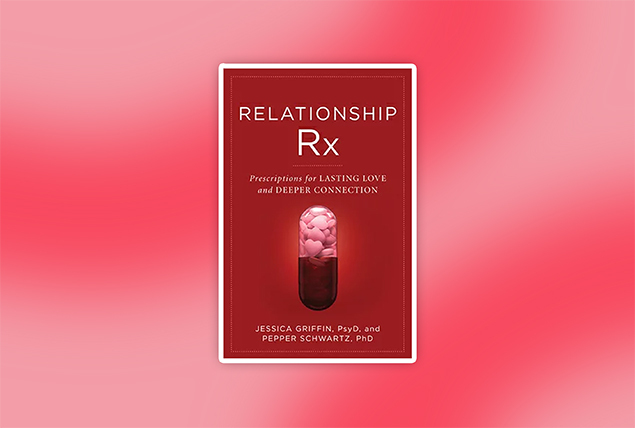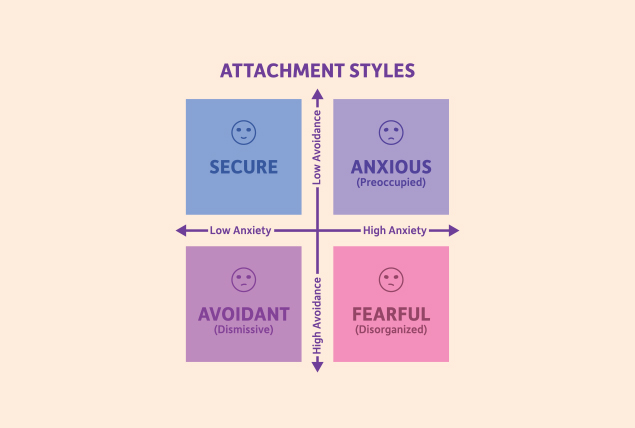Between the Pages: 'Relationship Rx' Offer Prescriptions for Love

Key Points
- Authors Jessica Griffin and Pepper Schwartz met while working as relationship and sexuality experts on the reality show "Married at First Sight."
- Employing a tiered approach in their book, Griffin and Schwartz offer relationship advice categorized into three levels: relationship vitamins, relationship medicine and relationship CPR.
- Having a regularly scheduled time for sex can be helpful for couples because there's an opportunity for anticipation.
Psychologist Jessica Griffin, Psy.D., and sociologist Pepper Schwartz, Ph.D., offer remedies for ailing relationships in their book "Relationship Rx: Prescriptions for Lasting Love and Deeper Connection," published by Rowman & Littlefield.
Each chapter contains three examples of couples experiencing varying severities of symptoms: mild, moderate and severe. The relationship experts provide evidence-based strategies and exercises for each.
Griffin and Schwartz cover the latest research into helpful communication strategies, attachment styles, cognitive behavioral therapy (CBT) and more. The format of the book presents everything in an easy-to-understand manner.
In this exclusive interview, Griffin and Schwartz discuss how they met on a popular reality show, how to increase libido after pregnancy, the challenges of severe problems in a sexual relationship and more.
Editor's note: This interview has been edited for length and clarity.
Tell us a little about your background, how you met each other, and the idea for 'Relationship Rx.'
Pepper Schwartz: I was teaching as a professor of sociology at the University of Washington in Seattle until a year ago when I retired. I remain an emeritus professor. I have been president of the Society for the Scientific Study of Sexuality and a fellow of the International Academy of Sex Research.
I met Jessica quite a few years ago when we were both relationship and sexuality experts—she from psychology, I from sociology—on "Married at First Sight," which is a successful reality show. I've always been impressed with what Jessica knows and how well she imparts it. We had great fun as colleagues, and still have great fun being colleagues, just at a distance now.
Jessica Griffin: I'm a clinical psychologist at UMass Chan Medical School. I've been here for 18 years. My areas of expertise focus on trauma and relationships. I run a statewide trauma center for children and families. I also have a program that has a national focus. It's called the Resilience Through Relationships Center. I conduct research and have a clinical practice, as well as developing programs.
I'm very interested in attachment styles, particularly with romantic attachment. My initial work in attachment was actually in a monkey lab looking at infant monkeys and their moms, but I was actually largely just cleaning monkey cages. That was in the late '90s, early 2000s. Then I really shifted my focus to looking at other kinds of attachment relationships, from children and parents to adult romantic attachment.
Many years ago, I was asked to consider a reality docuseries. I did not have any experience with that. I became a relationship expert on another show before I ended up going on "Married at First Sight," and that's where Pepper and I met, and where a lot of our late nights and early mornings spent together created the idea for this book.
Recommended
- How to Spot a Relationship Scammer: If you don't want to be swindled on Tinder or tricked into paying for a fake heiress, read this.
- Don't Look to Comics for Relationship Advice: Turns out, superheroes are better at saving cities than coping with their emotional trauma.
- Not in the Mood? Dehydration May Be to Blame: A lack of liquid can have serious side effects on your sexual health.
Why did you choose the approach of having different treatment categories—relationship vitamins, relationship medicine and relationship CPR—depending on the severity of the couple's problems?
Griffin: Both of us work in academic settings. I do a lot with medicine in general. So it sort of fits with the settings we're practicing in.
Pepper and I, in some of our late-night talking, said, "Gee, we have these exercises we're teaching in this very short period of time to people who just met each other at the altar [on "Married at First Sight"]. And then there are the exercises we know work in our coaching with couples in our private practices. Wouldn't it be great if we could get that information in a book?"
Our thoughts were to present exercises and strategies couples can do in their daily lives, like taking vitamins, with the goal of having relational health. That was sort of how we got to the way we tiered the book.
There are going to be things all of us can do. We might be in a pretty happy relationship, but there are things we could do to make sure the relationship remains healthy. Everybody is going to have bumps in the road, and there are going to be times when most of us will require some sort of relationship medicine if there's a more serious problem. If we don't address it, we're going to have very serious issues.
We've got the mild, moderate and severe categories with the solutions being vitamins, medicine and CPR. But the real idea was to come up with practical strategies based on science.
Schwartz: We wanted to help people recognize what stage they might be at with a given problem. So if you have something at the vitamin level, you can be reassured and say, "Here's something relatively easily you can do to not let this thing get worse or to solve it."
But we also wanted to help people who were at the more extreme levels and to recognize that sometimes people have a tendency to play down how bad something is.
One of the couple examples is Ariana and Benito. Ariana had a baby 10 months ago and they aren't having sex. Benito is frustrated and confesses to fantasizing about other women. What tools and strategies at the vitamin level can help them?
Griffin: For this one, we suggested scheduling sex and working out. We suggested an exercise routine and then the opportunity for connection around that. This is a common phenomenon with new parents. Sleep deprivation is very significant as far as impacting dysregulation everywhere. It affects your mood and it plays into your libido.
Sometimes, when there's a new baby, the couple hasn't had sex. There are couples who don't have sex during the pregnancy. Having a regularly scheduled time, even though it doesn't sound sexy because it's not spontaneous, can actually be helpful for couples because there can be an opportunity for anticipation. They can plan for it, they know it's going to happen.
Having a routine in place says, "OK, this is a priority." We may not get to it until then, but we will at a certain point.
Are You Staying in a Toxic Relationship Because the Sex Is Great?: If incredible sexual chemistry is a couple's only redeeming quality, experts have some advice. We shouldn't do it. Right?
Working out and exercising can address a lot of different problems. [In our example couple,] Ariana is struggling with body image issues. Exercise is going to help her with that, too.
Exercise can decrease depression as much as some antidepressants. Ariana was struggling with postpartum depression, so having a workout routine together with her partner and then using it as an opportunity to have a healthy meal together or shower together can be beneficial. Really, whatever makes sense for you.
Also, exercise is an opportunity to get the blood flowing and get moving again. It gets you out of the mom and dad role you may have slipped into.
Sexual relationships with severe symptoms may have infidelity involved. Or maybe the couple has gone years without having sex. What are some CPR prescriptions for couples having major sexual difficulties?
Schwartz: We often get a third party involved when it's CPR level. We've had couples who hadn't had sex for years. And yet, they're not really ready to leave one another. Let's say it was over an act of infidelity, and they're angry, but then suddenly they realize they could lose the whole thing and they're motivated enough to go see somebody about it.
If you can't recognize you're at this CPR moment, that's when a crack in the relationship can turn out to be a chasm. That could be where someone is so unhappy they don't want to stay or it turns out their partner is actively having a parallel relationship elsewhere.
I think a talented therapist can bring a couple back together because they can help trace down what this is really about. Perhaps someone is depressed? Maybe somebody isn't managing triggers well from their past?
We talk a lot about triggers in the book: finding out where they are and what has activated them and whether they're being shared with each other. We have some exercises about how you can share what things are going to have an irrational response. That is, a big response because they're from either your childhood or a former relationship.
If you have to do that kind of excavation, you often need a third party to give you some parameters and set you on a new road.
You can do some Masters and Johnson-type exercises and feeling exercises to slowly walk your way back toward trust and love. However, the longer a problem persists, it becomes more difficult to forget or forgive. And it can be that much harder to revive the physical part of your relationship. In cases like this, the motivation is to avoid the end of the relationship.


















